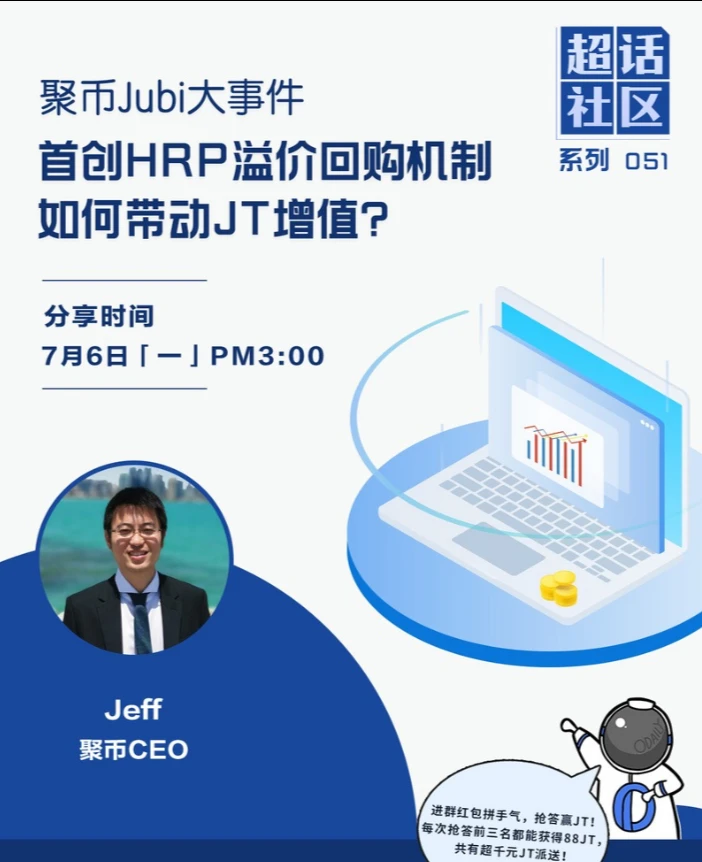
In the past two years, platform currency has become another important investment target for crypto investors.
OdailyStatistics show that in the first quarter, the revenue of the three major platform currencies outperformed Bitcoin; but in the second quarter, the gains of the three major platform currencies weakened, and the overall revenue (average 20%) was lower than that of Bitcoin (40%).
Especially at the moment, Bitcoin has completed halving but failed to bring about a big bull market. Whether the platform currency is worth investing in has become a hot topic of discussion.
On July 6, Jeff, CEO of Jubi, visited the Odaily Chaohua community to explain in detail Jubis first HRP premium repurchase mechanism for users. Jeff said that this year is the best performance opportunity for platform coins. The income of many platform coins exceeds that of mainstream coins, which shows that platform coins are worth investing in at the moment, and it also reflects that peoples investment concepts towards digital currencies have changed.
The following is a record of the community interview, organized by Odaily:
The following is a record of the community interview, organized by Odaily:
Q1: The IEO in 2019 brought the popularity of platform coins, and the revenue of many platform coins even far exceeded that of Bitcoin. Now that IEO is gradually showing signs of weakness, the halving of Bitcoin has failed to bring about a big bull market, and the encryption market is quite sluggish. The first question is, do you think platform tokens are worth investing in under the current environment? What is the value support of the platform currency?
Jeff:Just because mainstream currencies such as Bitcoin failed to bring about the expected bull market, this year is the best performance opportunity for platform currencies. The income of some platform coins exceeds that of mainstream coins, which just shows that platform coins are worth investing in at the moment, and it also reflects that peoples investment concepts towards digital currencies have changed.
The value support of the platform currency is the development concept of the trading platform and reflects the value of the platform. Only by always focusing on users and continuously increasing the rights and interests of platform currency holders can the trading platform continue to develop in the long run. Secondly, the trading platform must continue to innovate the gameplay, break through the existing thinking, and allow the platform currency to continue to increase in value.
Q2: For platform currency, many investors attach great importance to its repurchase policy. From monthly repurchases to quarterly repurchases, from income repurchases to profit repurchases, each company has different measures. How do you comment on the current platform currency repurchase policy in the market? What do you think are worth learning or what problems exist?
Jeff:Most of the existing repurchase mechanisms in the market are big thunder, little rain. When they are announced, they are huge, causing a short-term influence and then disappearing. Or it seems that the repurchase has been going on, but the repurchase mechanism is not public, the repurchase funds and the repurchase algorithm are not transparent, resulting in no price change no matter how much the repurchase is.
The economic model of the repurchase makes sense, but there are many problems in the actual operation; the model of the repurchase is not clear, and in the end it has no effect on the currency price. Due to lack of clarity and no new model, the markets reaction to this has been relatively weak.
In general, the current market lacks a repurchase mechanism, an open and transparent algorithm, and a powerful repurchase mechanism that can actually drive the appreciation of the platform currency through repurchase.
Q3: On June 10, Jubi launched the platform currency JT. Can you first introduce the release of JT and related application scenarios?
Jeff:JT (Jubi Token) is the platform token of Jubi, referred to as chicken leg. Jubi has now taken the development of JT Ecology as the primary development task of the platform. Since the launch of JT in June, JT Ecology has implemented a number of strategic plans and achieved great success. JT holders have obtained many JT holders such as JT everyone is a node, JT voting for listing, JT ecological security deposit, JT holder protection rights, JT discount purchase, JT holder mainstream currency transaction fee 50% discount, etc. Exclusive benefits.
In the future, JT ecological development will also include JT trading area, Jubi Cloud and other strategic plans. JT will not only play an important pivotal role in the Jubi ecosystem, but also rely on the payment network of Uniweb Group, the parent company of Jubi, to open up offline payments and expand more application scenarios, promoting the accelerated integration of digital finance and traditional finance.
Q4: On July 2, Jubi announced the launch of the repurchase plan in July, which highlighted the adoption of a new HRP premium repurchase model, and monthly premium repurchase at the HRP price. Could you please explain what is HRP price and how to calculate it?
Jeff:HRP (Highest Reached Price) refers to the highest reach price, which refers to the highest selling price that can be obtained for the funds used for repurchase according to the market price, that is, the monthly JT repurchase price. Jubi will directly repurchase JT at the HRP price at 50% of the monthly currency handling fee, and at the same time open the secondary market repurchase + off-site repurchase pool repurchase. That is to say, 25% will be repurchased directly at the HRP price in the secondary market, and the other 25% will be repurchased at the off-site repurchase pool at the HRP price.
The HRP repurchase price is based on the public repurchase calculation formula, the pending order data sample with the minimum fluctuation of 3 days at the end of the last month, and the three dimensions of the currency transaction fee in the previous month, and the repurchase price of the next month is directly given after comprehensive calculation.
For example, the HRP price in July is 0.221U, and the sampling data is the pending order data of the three days (June 25, June 26, and June 30) in the last week of June when the market volatility is small. July HRP repurchase price.
The specific algorithm can be viewed in the monthly operation report of the Jubi official website:https://jubi.zendesk.com/hc/zh-cn/articles/900001631283-
Q5: Could you please introduce the repurchase fund size, repurchase cycle (next repurchase time) and repurchase method of Jubi platform currency?
Jeff:In the HRP premium repurchase model, the JT repurchase fund is 50% of the monthly currency exchange fee, that is, 25% of the fee will be placed in the secondary market at the price of HRP, and 25% of the fee will be in the independent repurchase pool Make a repo.
The repurchase cycle is monthly repurchase. The July repurchase time is July 15th, and the specific announcement on Jubi’s official website ju.com shall prevail.
Q6: Everyone may be very concerned about a question. If you buy platform tokens the day before Jubi’s repurchase and wait for the next day’s repurchase to sell, what are the risks and benefits of this short-term arbitrage?
Jeff:There is room for such arbitrage, but it makes no difference to us. The funds for HRP repurchase are fixed, and it is no problem for us to give this part of the arbitrage profit to users.
Q7: You just mentioned that 25% of the repurchase funds will be repurchased in the off-site repurchase pool. How do users enter the repurchase pool, and what are the repurchase rules of the repurchase pool?
Jeff:The off-site repurchase pool repurchase is a stable JT high premium repurchase method, and the quota is allocated according to the users contribution. Everyone can participate in the application, and the amount of repurchased JT shall not exceed the average JT holdings of the user 15 days before the application. Such an off-site repurchase method, which gives the proceeds to users who have contributed to the platform, is a healthy development for the platform, bringing a large number of new users, and promoting the platform’s fee income, increasing future repurchase funds, and benefiting the platform and JT prices are all positive and healthy.
Q8: Compared with the repurchase models of other platforms, what differentiated advantages do you think the HRP premium repurchase model has?
Jeff:One of the differentiating advantages: the HRP repurchase mechanism is a dual-channel repurchase. Jubi will use both the secondary market and off-market channels to repurchase at the same time. 25% of the handling fee will be placed in the secondary market at the price of HRP, driving up the price, and 25% of the handling fee will be repurchased in the independent repurchase pool Users can apply for participation, and the repurchase quota will be allocated according to the contribution index.
The second differentiated advantage: the HRP repurchase model will directly drive the value-added of JT. Whether it is directly placing an order to repurchase at the HRP price in the secondary market, or conducting an off-site repurchase pool repurchase at the HRP price, it is the most direct way for users to repurchase JT at a high premium. The first HRP repurchase model will bring a large number of newly added and relatively stable JT holders to the Jubi platform, which will actually drive the continuous appreciation of JT and promote the rapid growth of JT.
The third differentiated advantage: the repurchase algorithm of HRP premium repurchase is transparent. Not only is the monthly repurchase fund source fixed, but the repurchase algorithm, repurchase time, and repurchase mechanism are all transparent. This is different from the existing market, and the open and transparent repurchase mechanism will effectively drive up the price of JT and bring benefits to investors.
Q9: In the HRP premium repurchase model, is the JT repurchased every month used for destruction?
Jeff:The JT repurchased every month will be locked, part of it will be used to pay the income of the locked node, and the rest will be destroyed. Moreover, we do not have the final amount of repurchase and destruction, and we will always insist on destruction.
Q10: In the future, how will Jubi further empower JT?
Jeff:Every step in the future development of Jubis JT Ecology is aimed at benefiting JT holders. Just like the first HRP premium repurchase mechanism, Jubi will continue to increase the exclusive rights and interests of JT holders through innovative gameplay, protect the rights and interests of JT holders in a direct and practical way, and drive the continuous appreciation of JT.
Q10: For users, the value of platform currency is inseparable from the development of transactions. What are the future strategic plans of Jubi?
Jeff:The development of Jubi JT ecology will also include Jubi Cloud, JT Trading Zone, etc. Jubi will adhere to the original intention of taking users as the core and taking JT holders as shareholders to continuously promote the sustainable development of JT ecology .
Next, Jubi will also launch a series of high-quality platform activities. For example, the upcoming Jubi Express, the platform will select 100 high-quality projects to be listed on Jubi within 100 days through the recruitment of project recommendation officers. At the same time, the platform has set up a high rebate bonus pool of up to 1 million JT for institutions or individuals who recommend projects. It is hoped that organizations such as communities, media, funds, or people with channel resources will recommend more high-quality and potential projects for Jubi.










